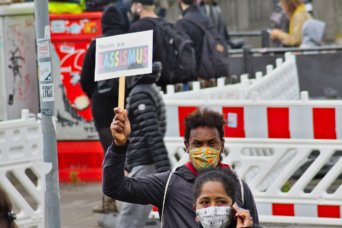- About
- Topics
- Picks
- Audio
- Story
- In-Depth
- Opinion
- News
- Donate
- Signup for our newsletterOur Editors' Best Picks.Send
Read, Debate: Engage.
| topic: | Racism |
|---|---|
| located: | Germany, United Kingdom |
| editor: | Gurmeet Singh |
The Black Lives Matter protests have made it possible to discuss systemic racism in numerous contexts. In some countries, like in the U.K. for example, the discussions and protests have even transformed into something unexpected. In Bristol, the statue of slave trader Edward Colston was pulled down and tossed into the river, inspiring other cities to reconsider their public artworks. Although the ‘Rhodes Must Fall’ started in 2015 in South Africa, it spread across the world and had a high point shortly after. It has since fallen from public attention. Now, Prime Minister Boris Johnson has had to issue a warning against protestors forcibly taking down other statues.
In Germany however, the debate has not necessarily developed into something more productive. Related events coinciding with the protests have diverted attention away from the core messages of the movement: that systemic racism exists and black people feel the brunt of it, particularly when it comes to police brutality.
No, instead, in Germany, once again the country is talking about the AfD. Al-Jazeera writes:
“Germany's Constitutional Court has ruled that Interior Minister Horst Seehofer had breached neutrality rules when his ministry published on its website comments in which he accused the far-right Alternative for Germany (AfD) party of subversion.
Tuesday's largely symbolic ruling is a victory for the AfD, which has been grappling with an internal power struggle.
Seehofer said in a 2018 interview with the DPA news agency that despite declarations by its leaders of being a democratic party, the AfD "stands against this state" and that its verbal attacks against government figures amounted to "subversion".
The AfD took legal action against Seehofer, who is a member of the Christian Social Union (CSU), Bavarian allies of Chancellor Angela Merkel's conservative Christian Democrats (CDU), after his office published the interview on the interior ministry website.”
Although symbolic, the ruling has given the party a major boost and even given it an added veneer of respectability. It may have the effect of somewhat further legitimising the party, as well as its anti-democratic and prejudicial agenda, at a time when the rest of the world is having serious discussions about racism.
That being said, it’s not a total endorsement of the party. The ruling only specifies that Seehofer broke objectivity rules in his official capacity – the ruling does not assess the truth of the claim that the AfD is a “state-destroying” party.
There is significant pushback against calls for Germany to seriously take a look at its problems with systemic racism. Friedrich Merz, a prominent CDU politician (who is often touted to become leader of the party at some point), said that not only is Germany “not comparable” with the USA, but that there is “no latent racism in the German police” system.
Although the AfD’s victory in the court case is not directly linked, it offers weight to the counter-narrative: that there is no racism in Germany, and parties like the AfD are acceptable and respectable.
“Seehofer made the remarks about the AfD after Germany’s worst far-right riots in decades erupted in the eastern city of Chemnitz in August 2018 following news of the fatal stabbing of a German man by two Arab asylum seekers. Some AfD members took part in demonstrations in the city denouncing the killing.”

